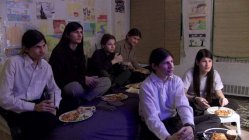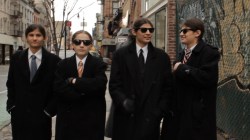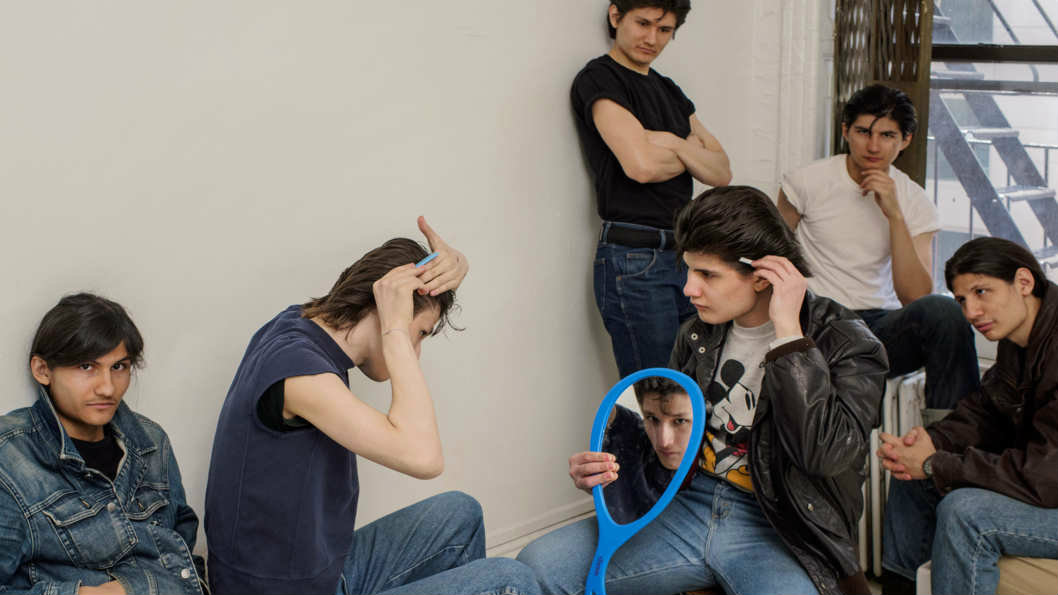 Magnolia Pictures
Magnolia PicturesWatching The Wolfpack, I knew why I liked it. But I was a little surprised at all the critical and audience acclaim the film has garnered as it made the festival circuit this year, beginning with its premiere at Sundance.
It’s not that the film isn’t well made. On the contrary: director Crystal Moselle stands back from her subjects, allowing them to do most of the talking. Her camera is remarkably nonjudgmental, especially given how easily it could have become a “look at the freak show” sort of film.
That’s because the film’s subjects—the eponymous wolfpack—are a group of six brothers, now older teenagers and young adults, who have lived in an apartment on Manhattan’s Lower East Side with their sister and parents for their whole lives. Literally lived in the apartment—“Sometimes we go out nine times a year,” one of them tells us, “sometimes one.”
Their parents met in South America, and since then wound up in New York City. This is where things get complicated. Their father has cobbled together a kind of philosophy of life that distrusts the outside world and values not being a slave to society. If they weren’t in downtown Manhattan, they’d be off-the-grid survivalists.
The boys were taught to avoid others and required to stay indoors. Their mother homeschooled them, citing the bad “socialization” in schools, while their father stays isolated from the family in his bedroom and doesn’t work. He has the only set of keys for the apartment. Obsessed with Hare Krishna, he gave all the children Sanskrit names, and they grow their hair long. They’re “our own community, our own race, here,” says one of the brothers.
“We were frightened kids,” one brother says. “That was one of the first memories I have.”
Of course, New York City isn’t the middle of nowhere, but it’s also one of the safest big cities in the world, and the Lower East Side these days is full of hipsters and artists and people who’ve lived there their whole lives. But having been brought up in the apartment, they don’t know much about the world out there except what their parents have told them. Except for one thing: they watch lots of movies.
Movies are their one connection to the world beyond, a way to break up the boredom and be free for a while. And then they recreate the movies in startlingly elaborate productions. One brother sits in front of films and transcribes the screenplay. They construct costumes and sets that are far better than you’d expect from people who essentially have nothing to work with.
The brothers favor violent and dark films (Pulp Fiction, The Dark Knight, The Outsiders) and then act, direct, and shoot them, line by line, accents and all, in their living room. Moselle cuts in footage of this, along with footage from their childhood. There’s a contrast between the children’s innocence and the older boys’ violent profanity-laced amateur filmmaking, but they’re more alike than different: having been brought up separate from the outside world, the boys are not a whole lot different than Chauncey, the protagonist of Being There, who was brought up in a garden and never left till he was an adult, but learned all of his language from television. They are child-like, reeling off lines of gangster-cool dialogue, then telling Moselle matter-of-factly, “I think you’re the first person to be invited over here.”
 Magnolia Pictures
Magnolia PicturesSo when they finally venture out, the brothers dress in sunglasses and dark clothing, looking for all the world like they just walked out of a gangster film, a little tentative about what’s outside. They see their first movie in a theater. They begin to talk about whether they’ll ever be able to face their father (they do this so much that it’s well into the film that you realize their father is alive and living in the apartment).
There is a deep, disturbing undercurrent here of abuse—not physical or sexual, but certainly mental. One of the brothers says that he thinks of his father as “the landowner and us the people who work on the land.” “A prison,” another one agrees.
Later, on camera, their mother—usually calm—breaks down. “There were probably more rules for me than there were for them,” she says, refusing to say more. And their sister is spotted on screen a few times, clearly developmentally disabled (one of the brothers says she’s sort of in her own world).
As the film moves on, though, the brothers start to venture into the world. That’s where the story takes a turn, and I think that’s why the film appeals so far beyond a sort of can’t-look-away curiosity, something you read about with horror in a magazine.
Many people my age (including myself) lived fairly sheltered, off-the-grid lives as young people. Most of us were lucky enough to live in loving families where we were nurtured and brought up well, and it’s not as if we only left our homes once per year, though I knew people in the fringes of fundamentalist Christianity, and other religions, who did grow up that way. But for many of us, the outside world was a scary place to fear, and that was the big reason we stayed away. (A lot of us—me included—didn’t even watch movies.)
Many were made to feel that they wouldn’t be safe or able to cope with the “real world,” usually by authority figures. Sometimes they were parents; sometimes church or other religious leaders; sometimes teachers or other people. Simple things, like driving a car or traveling, became sources of anxiety or things to be avoided. Even those who weren’t abused were sometimes taught fear—implicitly or explicitly—rather than courage.
 Magnolia Pictures
Magnolia PicturesSo when many did finally venture out, we felt a lot like one of the brothers: “My biggest fear was being so ignorant of the world I wouldn’t be able to handle it.”
When that was me, I assumed everyone else had it all together and that nobody who didn’t grow up like me would understand. But I sense, reading people write about The Wolfpack, that it’s not merely the compelling filmmaking that they’re reacting to. Without ignoring the unsettling element of abuse—Moselle tries to let the father explain himself, as best he can (it turns out he, too, is afraid)—it seems we all are afraid of what we don’t know, and the family’s story is one of complicated acceptance, of learning to edge past fear and start cutting down the brush towards one’s own path.
At the end of The Wolfpack, one of the brothers is working on his own original film, the first original work we’ve seen in the movie. You have to wonder how much Moselle’s presence in the family over such a long period of time had on everyone in the film. That subtle symbolism works, and not just because the film is about confronting emotions, something the family hasn’t done in a long time, but because it’s about something we all recognize in ourselves. I suppose it’s fear that keeps us copying others, instead of striking out and doing something new. And it’s fear—even when it’s taught—that's cast out by perfect love.
Caveat Spectator
For people who have suffered from an overbearing spiritual or emotional abuse, The Wolfpack should carry a (true) trigger warning. However, it’s understated, and the focus is on the healing process, and it’s not sensationalized at all. The R rating is entirely for profanity, all of which was picked up from other films (and often happens in the context of quoting lines from films), but the boys also sprinkle their talk with the same words. The effect is almost comical, but families should be warned.
Alissa Wilkinson is Christianity Today’s chief film critic and an assistant professor of English and humanities at The King’s College in New York City. She tweets @alissamarie.












